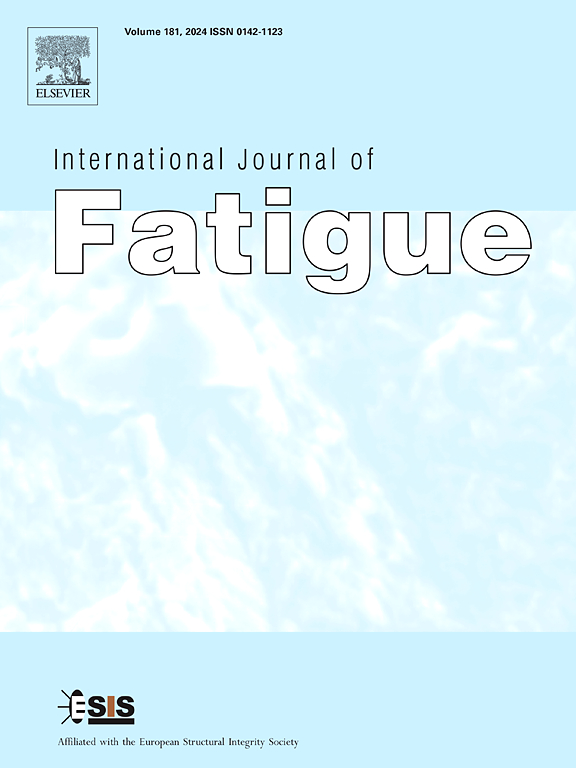一种评估双向复合材料在变幅载荷下疲劳行为和损伤演化的新实验方法
IF 5.7
2区 材料科学
Q1 ENGINEERING, MECHANICAL
引用次数: 0
摘要
本研究提出了一种新的实验方法来评估双向玻璃纤维增强聚合物(GFRP)复合材料在变振幅顺序块加载条件下的疲劳性能。该方法结合了先进的加载协议来模拟真实的使用条件,捕捉复合材料独特的复杂非线性应力相互作用和损伤进展。实验装置确保了对载荷序列和应力块的精确控制,促进了基于疲劳寿命、刚度退化和热响应的疲劳性能和失效机制的全面理解。结果表明,载荷顺序、循环混合和应力水平对疲劳行为有显著影响,为材料性能和损伤演变提供了重要见解。主要研究结果强调,与低到高(L-H)载荷相比,高到低(H-L)载荷对疲劳性能的显著影响,显示疲劳寿命降低了38%。研究还证明了裂纹萌生速率和扩展速率对两种加载模式下疲劳性能的影响。为了捕捉变载荷条件下的非线性损伤累积,提出了加载序列敏感损伤规律。这项工作为改进GFRP复合材料在工程应用中可变振幅载荷下的设计和可靠性提供了一个强大的框架。本文章由计算机程序翻译,如有差异,请以英文原文为准。
A novel experimental method to evaluate the fatigue behaviour and damage evolution of bi-directional composites under variable amplitude loading
This study presents a novel experimental approach to evaluate the fatigue performance of bi-directional glass fiber-reinforced polymer (GFRP) composites under variable amplitude sequential block loading conditions. The proposed method incorporates advanced loading protocols to simulate realistic service conditions, capturing the complex nonlinear stress interactions and damage progression unique to composite materials. The experimental setup ensures precise control over load sequences and stress blocks, facilitating a comprehensive understanding of fatigue performance and failure mechanisms based on fatigue life, stiffness degradation and thermal response. Results demonstrate a significant influence of load sequence, cycle mixing and stress level on fatigue behaviour, providing critical insights into material performance and damage evolution. Key findings highlight the pronounced effect of high-to-low (H-L) compared to low-to-high (L-H) loading regimes on fatigue performance, showing up to 38 % reduced fatigue life. The study also demonstrates the influence of crack initiation and propagation rates on fatigue performance under both loading regimes. A load sequence sensitive damage law has been proposed to capture the nonlinear damage accumulation under variable loading conditions. This work provides a robust framework for improving the design and reliability of GFRP composites subjected to variable amplitude loading in engineering applications.
求助全文
通过发布文献求助,成功后即可免费获取论文全文。
去求助
来源期刊

International Journal of Fatigue
工程技术-材料科学:综合
CiteScore
10.70
自引率
21.70%
发文量
619
审稿时长
58 days
期刊介绍:
Typical subjects discussed in International Journal of Fatigue address:
Novel fatigue testing and characterization methods (new kinds of fatigue tests, critical evaluation of existing methods, in situ measurement of fatigue degradation, non-contact field measurements)
Multiaxial fatigue and complex loading effects of materials and structures, exploring state-of-the-art concepts in degradation under cyclic loading
Fatigue in the very high cycle regime, including failure mode transitions from surface to subsurface, effects of surface treatment, processing, and loading conditions
Modeling (including degradation processes and related driving forces, multiscale/multi-resolution methods, computational hierarchical and concurrent methods for coupled component and material responses, novel methods for notch root analysis, fracture mechanics, damage mechanics, crack growth kinetics, life prediction and durability, and prediction of stochastic fatigue behavior reflecting microstructure and service conditions)
Models for early stages of fatigue crack formation and growth that explicitly consider microstructure and relevant materials science aspects
Understanding the influence or manufacturing and processing route on fatigue degradation, and embedding this understanding in more predictive schemes for mitigation and design against fatigue
Prognosis and damage state awareness (including sensors, monitoring, methodology, interactive control, accelerated methods, data interpretation)
Applications of technologies associated with fatigue and their implications for structural integrity and reliability. This includes issues related to design, operation and maintenance, i.e., life cycle engineering
Smart materials and structures that can sense and mitigate fatigue degradation
Fatigue of devices and structures at small scales, including effects of process route and surfaces/interfaces.
 求助内容:
求助内容: 应助结果提醒方式:
应助结果提醒方式:


